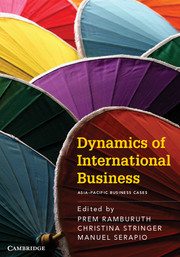Book contents
- Frontmatter
- Dedication
- Foreword
- Contents
- Contributors
- Preface
- Part I The Environment of International Business
- Part II Strategy and Entrepreneurship in International Business
- 6 Dewak: The positioning and growth of a born global software firm from a developing country
- 7 Qingdao Applied Chemistry Company (Kingking): Pivoting into a new global strategy
- 8 Bangkok Dusit Medical Services Public Company Limited: Healthy international expansion
- 9 The growth and internationalisation of Geely – the Chinese car manufacturer
- 10 Parking Creators International
- 11 Tasty Southern Seeds
- 12 Introducing innovations in education: The Ateneo Graduate School of Business
- Part III Managing People in International Business
- Part IV Operating in International Markets
- References
9 - The growth and internationalisation of Geely – the Chinese car manufacturer
Published online by Cambridge University Press: 05 August 2013
- Frontmatter
- Dedication
- Foreword
- Contents
- Contributors
- Preface
- Part I The Environment of International Business
- Part II Strategy and Entrepreneurship in International Business
- 6 Dewak: The positioning and growth of a born global software firm from a developing country
- 7 Qingdao Applied Chemistry Company (Kingking): Pivoting into a new global strategy
- 8 Bangkok Dusit Medical Services Public Company Limited: Healthy international expansion
- 9 The growth and internationalisation of Geely – the Chinese car manufacturer
- 10 Parking Creators International
- 11 Tasty Southern Seeds
- 12 Introducing innovations in education: The Ateneo Graduate School of Business
- Part III Managing People in International Business
- Part IV Operating in International Markets
- References
Summary
In March 2010, Chinese car maker Geely (a Chinese word meaning auspicious or lucky) signed a deal to buy Volvo from the US car giant Ford for US$1.8 billion. The acquisition is considered to be an example of China’s growing influence in a range of industries on the international stage. It is fresh evidence of foreign direct investment (FDI) being made by Chinese car makers in a bid to gain access to European markets and Western technology. The Volvo deal placed Geely – which was barely known outside of China – in the spotlight. It also raised questions about just how ready Geely was to be a major player on the global stage. Did Geely have a clear and robust strategy for further development of its fledging international strategy? Was the purchase of an extremely well-established Western auto manufacturer by Geely – an emerging market automobile manufacturer – an act of egotism or a sound and strategic long-term investment? This case provides an insight into the global automobile market and China’s growing interest, as well as an indication of Geely’s growth and expansion, culminating in the takeover of Volvo.
Background: the automobile industry worldwide
The automobile industry is a large and critical sector of the global economy. Over the last few years, there have been dramatic changes affecting the industry. For example, significant changes are evident in the European Union and the United States, whose economies have suffered as a result of the global economic slowdown, leading to a decrease in car sales and a decline in the relative markets. In contrast to these declining trends in developed countries, emerging economies have become fast-growing markets for the automobile industry. China became the world’s third largest car market in 2006, and then the largest in 2009; additionally, India recently posted its highest ever car sales figure – 195 million cars in 2011 (Gulati & Choudhury 2012). It is anticipated that the emerging markets will experience continued growth, with drivers including rising incomes, increasing availability of credit and falling car prices.
- Type
- Chapter
- Information
- Publisher: Cambridge University PressPrint publication year: 2013
References
- 1
- Cited by

